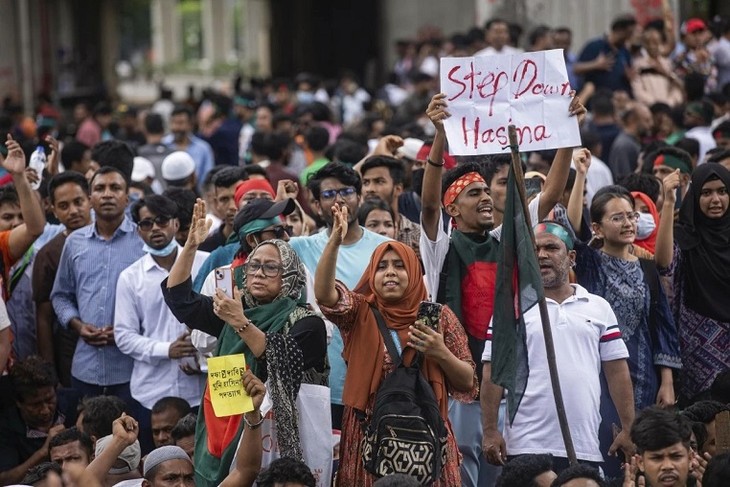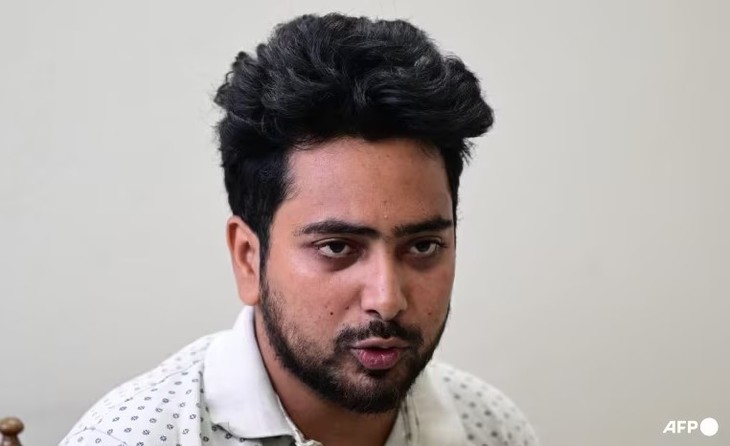(VOVWORLD) -On Monday, after days of violent protests, Prime Minister of Bangladesh Sheikh Hasina resigned and left the country on a helicopter. Bangladesh’s future is insecure and full of uncertainties.
 Protesters in Dhaka call on Prime Minister Sheikh Hasina to resign on August 5, 2024. (Photo: AP) Protesters in Dhaka call on Prime Minister Sheikh Hasina to resign on August 5, 2024. (Photo: AP) |
A wave of protests began in early July when Hasina’s government announced a quota in civil service and public sector jobs. The protests quickly escalated into violence which killed more than 300 people in a month and drove Mrs. Hasina from the country.
Controversial policy
The employment quota policy released in June allocates more than half of new civil service and public sector jobs to vested interest groups, including 30% to the descendants of individuals who participated in the 1971 movement to free Bangladesh from Pakistan.
According to Professor Rashed Al Mahmud Titumir of Dhakar University, the policy was introduced at an inopportune time, when unemployment among Bangladeshi youth is increasing rapidly. 20% of people between 15 and 24 years old are unemployed and not attending school.
Each year 2 million people enter the labor market. The chance of becoming a public employee was less than 1 in 100 last year, when 346,000 candidates applied for 3,300 positions. The new employment quota immediately triggered strong opposition from young people, who called it unfair and discriminatory.
On July 21, the Supreme Court of Bangladesh lowered the quota for descendants of veterans from 30% to 5%, and said 93% of a candidate’s assessment must be based on competency rather than background, and a 2% quota must be rserved for people with disabilities, ethnic people, and transgender people.
Despite the court ruling, student-led protests didn’t cool and the protesters began demanding that Prime Minister Hasina resign. The protests quickly escalated into violent clashes involving opponents and supporters of Hasina and security forces. The peak of the clashes came on Sunday, when 94 people, including 14 police officers, died in unrest, forcing the Prime Minister to resign after 15 years in power and flee the country.
To maintain constitutional order, Commander General Waker-Uz-Zaman announced that the army would temporarily take control of the country until a transitional government can be established. He said Monday that he had talked to all parties about establishing an interim government, and called on the Bangladeshis to trust the army to soon restore order.
“Please keep faith and trust in the military. I take responsibility and promise to protect people's lives and property. We will meet the people’s demands and resume peace and harmony in the country. I ask everyone to stop all acts of violence, vandalism, and protest,” the Commander General said.
 Nahid Islam, a key organizer of the Students Against Discrimination movement, is released on August 1, 2024. (Photo: AFP/Munir Uz Zaman) Nahid Islam, a key organizer of the Students Against Discrimination movement, is released on August 1, 2024. (Photo: AFP/Munir Uz Zaman) |
Uncertain future
The army said the curfew imposed on July 20 to quash protests was officially lifted at dawn Tuesday. Offices, factories, and schools have reopened.
Observers say it will be a challenge for Bangladesh to establish an interim government to stabilize the situation and then officially transfer power through democratic elections. The army has not yet made it clear whether it will hold the top position of the interim government or not. The students, the leaders of the recent protests, say they want a key role in the new government.
Nahid Islam, a coordinator of the Student Movement Against Discrimination, said: “We will soon put forward proposals on establishing an interim national unity government. Students and organizers of the recent protests will be part of the interim government, together with representatives of civil society and professional organizations. We will propose the personnel and direction of the interim government."
Political instability in Bangladesh is causing international concern. The World Bank said Tuesday that it will assess the impact of the recent political upheaval on its lending programs in Bangladesh. In June the World Bank approved a loan of 900 million USD to help Bangladesh improve its tax and financial policy-making capability and build infrastructure to better respond to climate change. In the fiscal year ending June 30, 2024, the WB lent 2.85 billion USD to Bangladesh.
Policy adjustments by the WB and other international financial institutions may harm Bangladesh's economic growth. The International Monetary Fund and the Asian Development Bank forecast that Bangladesh's economy would grow 6.1% this year and 6.5% next year.
Instability in Bangladesh increases tensions in South Asia. India has reinforced its border with Bangladesh and placed military units on high alert. The United Nations, the European Union, the United States, and many other countries have expressed concern about the situation in Bangladesh.